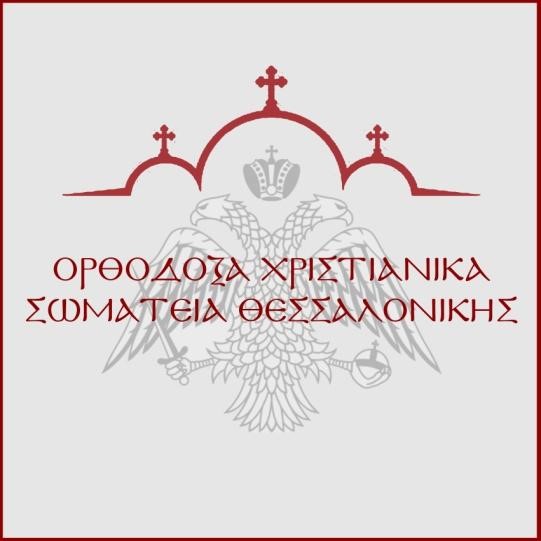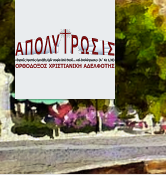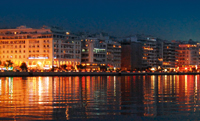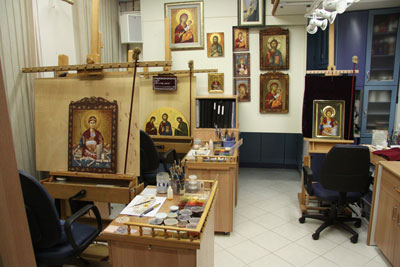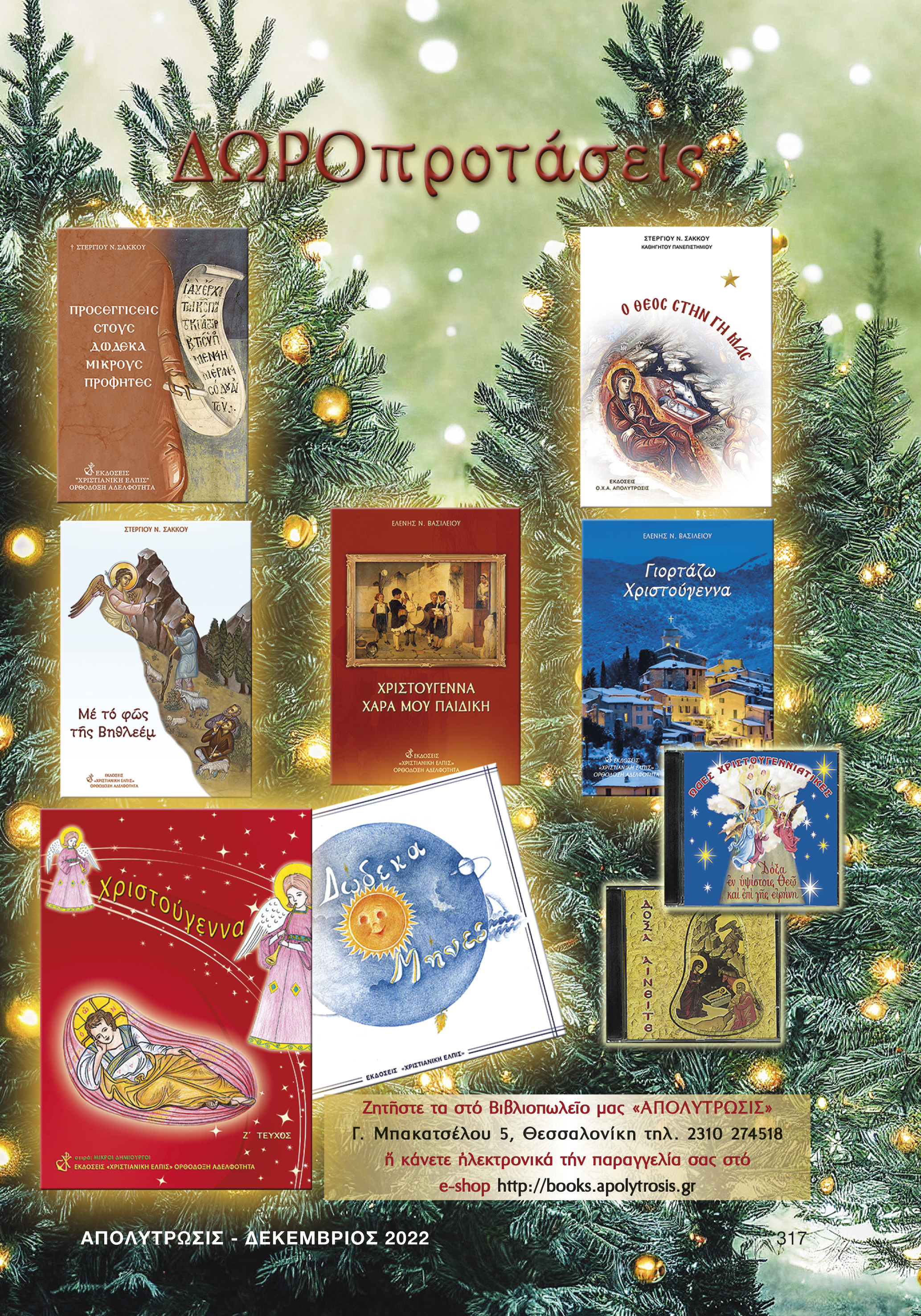 ΑΠΟΛΥΤΡΩΣΙΣ
ΧΡΙΣΤΙΑΝΙΚΗ ΟΡΘΟΔΟΞΗ ΑΔΕΛΦΟΤΗΣ
ΑΠΟΛΥΤΡΩΣΙΣ
ΧΡΙΣΤΙΑΝΙΚΗ ΟΡΘΟΔΟΞΗ ΑΔΕΛΦΟΤΗΣ
Super User
The Transfiguration of the Savior (B)
Translated excerpts from the book:
Στεργίου Ν. Σάκκου [Read CV], «Λάμψον καὶ ἡμῖν...», ἐκδ. «ΧΡΙΣΤΙΑΝΙΚΗ ΕΛΠΙΣ» ΟΡΘΟΔΟΞΗ ΑΔΕΛΦΟΤΗΤΑ, Θεσ/νίκη 2023.
A Fact of Our Personal History
 The historical event of the Transfiguration, as the Fathers of our Church emphasize, did not take place only once. It is an event of the past, the present, and the future. It is an event of the life of Christ, which occurred “at that time” on the holy mount of the Transfiguration, but also a reality that unfolds within the present course of history. This is confirmed by countless transfigured souls, who speak of their experience with a sweetness, a joy, and an exultation beyond expression. Furthermore, it is also a future event for every believer, who looks forward to a new transfiguration when he meets Jesus at the end of the world. The more he prepares himself each day through spiritual transfiguration for that final encounter, the more fully he will partake forever in the vision of the glorious Lord.
The historical event of the Transfiguration, as the Fathers of our Church emphasize, did not take place only once. It is an event of the past, the present, and the future. It is an event of the life of Christ, which occurred “at that time” on the holy mount of the Transfiguration, but also a reality that unfolds within the present course of history. This is confirmed by countless transfigured souls, who speak of their experience with a sweetness, a joy, and an exultation beyond expression. Furthermore, it is also a future event for every believer, who looks forward to a new transfiguration when he meets Jesus at the end of the world. The more he prepares himself each day through spiritual transfiguration for that final encounter, the more fully he will partake forever in the vision of the glorious Lord.
Spiritual Transfiguration (part 1)
The consistent living of the Christian life advances and spiritually transfigures the believer. Yet it requires his wholehearted spiritual struggle. This struggle is not driven by impersonal moral commandments but is inspired by the love of Christ. The recognition of this love, and the longing to respond to it, urges the believer to rise above his own desires and to submit to the will of God. Such submission becomes the offering most acceptable to God, offered in return for the saving sacrifice of our Lord Jesus Christ. This is precisely the sacrifice urged by the apostle Paul at the beginning of the twelfth chapter of the Epistle to the Romans; “I appeal to you therefore, brethren, by the mercies of God, to present your bodies as a living sacrifice, holy and acceptable to God, which is your spiritual worship. Do not be conformed to this world but be transformed by the renewal of your mind, that you may prove what is the will of God, what is good and acceptable and perfect” (Rom 12:1–2).
Having demonstrated in the first part of the Epistle—the theological section (chapters 1–11)—that Jesus Christ is the only Savior and Redeemer of all people, both Jews and Gentiles alike, the Apostle now calls upon the faithful to offer their own sacrifice in return for Christ’s redeeming sacrifice. That is, to present themselves as a living, holy, and acceptable sacrifice to God.
He does not, of course, mean the destruction of their bodies. As Theodoret explains: “For he does not command the bodies to be slain, but rather to be dead to sin.” What is required is the mortification of sin—the spiritual worship—which consists not in the offering of irrational animals, but in two things: love and purity (cf. Jas 1:27). Interpreting this apostolic exhortation, Saint John Chrysostom poses the question: “How can the body become a sacrifice? Let the eye look upon nothing evil, and it has become a sacrifice. Let the tongue speak nothing shameful, and it has become an offering. Let the hand do nothing unlawful, and it has become a whole burnt offering. Or rather, these are not sufficient; we also need acts of charity: that the hand may perform almsgiving, that the mouth may bless those who mistreat us, and that the ear may be constantly occupied with the hearing of the words of God.” We offer spiritual worship, as Saint Theophylact sums up, “when no irrational passion holds sway within us, when each person becomes the high priest of his own self and slaughters within him his vices.”
Yet in the world in which we live, we encounter many obstacles that prevent us from offering this spiritual worship unhindered. That is why the apostle Paul makes a second appeal: “Do not be conformed to this world but be transformed by the renewal of your mind.”
“To be conformed” means “to take on the same form,” the same outward appearance (see Phil 2:8). The Apostle instructs the faithful: you must be different; you must not be carried away by the worldview and way of life of “this present age”, of the world that surrounds you. That world has as its “ruler” the devil (see Eph 6:12), for it willingly submits to him. You, however, must not adopt its philosophy or its manner of living (cf. Jn 17:15–16; 1 Jn 2:15–17). If the faithful become identical in all things with the godless world, how will they fulfill the mission entrusted to them by the Lord: to be “the light of the world” (Mt 5:14), “lights in the world” (Phil 2:15)? If they yield to the influence of others, how shall their own life exert any influence upon the world around them? Worldliness—making compromises in order to please the desires of the world—will have disastrous consequences, both for their own spiritual life and for the society in which they live.
The motto of the first Christians, as we read in “The Didache of the Twelve Apostles”, holds true in every age: “Let grace come, and let this world pass away!” Against the world! Just as living fish swim against the current, while the dead are carried away by it. Against the world that constantly wears us down, distorts us, estranges us from God! Against the enticements, the demands, the fashions of the world!
Especially in our days, we all face the danger of worldliness, which assails us with the terrible flood of the pursuit of well-being and a life of ease. In truth, it has affected us all. It has wounded us deeply and holds us bound in chains; we can no longer find the strength to cast off its yoke. It would be good for us to ask ourselves often: “Am I truly a Christian?” Do I walk with Christ along the narrow and “hard” way, or do I follow the world along the wide and easy road? (see Mt 7:13–14).
The Transfiguration of the Savior (A)
Translated excerpts from the book:
Στεργίου Ν. Σάκκου [Read CV], «Λάμψον καὶ ἡμῖν...», ἐκδ. «ΧΡΙΣΤΙΑΝΙΚΗ ΕΛΠΙΣ» ΟΡΘΟΔΟΞΗ ΑΔΕΛΦΟΤΗΤΑ, Θεσ/νίκη 2023.
The Event of the Transfiguration in the Gospels
 Undoubtedly, the God-man Jesus Christ, during His earthly ministry, revealed His divinity in many ways: through His holy life, His words full of divine grace, the supernatural signs He performed upon inanimate creation (the feeding of the five thousand, the calming of the storm on the Sea of Galilee), as well as upon human beings themselves (healings, resurrections of the dead). However, during the Transfiguration, His revelation took place in a wholly unique manner. There, to the extent permitted by human nature, His divine glory was revealed. This event is narrated by the evangelists Matthew (17:1–8), Mark (9:2–8), and Luke (9:28–36). The evangelist John refers to it briefly, without narrating it (1:14), because he wrote his Gospel later, when the Transfiguration was already known from the other three Gospels that were circulating.
Undoubtedly, the God-man Jesus Christ, during His earthly ministry, revealed His divinity in many ways: through His holy life, His words full of divine grace, the supernatural signs He performed upon inanimate creation (the feeding of the five thousand, the calming of the storm on the Sea of Galilee), as well as upon human beings themselves (healings, resurrections of the dead). However, during the Transfiguration, His revelation took place in a wholly unique manner. There, to the extent permitted by human nature, His divine glory was revealed. This event is narrated by the evangelists Matthew (17:1–8), Mark (9:2–8), and Luke (9:28–36). The evangelist John refers to it briefly, without narrating it (1:14), because he wrote his Gospel later, when the Transfiguration was already known from the other three Gospels that were circulating.
The Transfiguration took place “on a high mountain” (Mt 17:1; Mk 9:2). There, Jesus was with only three of His disciples, away from the crowds, “by themselves” (Mt 17:1; Mk 9:2). The most paradoxical and wondrous things were performed by the Lord secretly and quietly, so that He might not be regarded by the crowds as “a man in appearance only,” as Saint Theophylact observes. Moreover, the Lord did not intend to display His glory before the multitude. His purpose was to grant His own disciples such an experience that they might not be scandalized or irreparably shaken at the time of the Passion, which He had just foretold to them. Through the Transfiguration, He revealed to them His divinity, in order to provide them with unshakable testimony — a firm assurance that His Passion was voluntary, in accordance with the eternal plan of the Triune God for the redemption of humankind. This is also proclaimed in the Kontakion of the feast:
Kontakion — Tone 7
On the mountain You were transfigured, O Christ God,
and Your disciples beheld Your glory as far as they could bear;
so that when they would see You crucified,
they would understand that Your suffering was voluntary,
and would proclaim to the world
that You are truly the radiance of the Father.
The Lord chose Peter, John, and James to go up with Him onto the mountain. Three witnesses were sufficient to confirm an event, according to Deuteronomy: “On the evidence of two witnesses or of three witnesses, a matter shall be confirmed” (see Deut 19:15). So, three disciples were enough to bear witness to the Transfiguration. These same three were also with Him at the raising of Jairus’ daughter (Mk 5:37) and during the agony in Gethsemane (Mt 26:37). Saint John Chrysostom explains: “These were superior to the others.” These three stood out among the Twelve and seem to have formed the core of the group. Peter, as we observe in the Book of Acts, later emerged as the foremost among the apostles. John was the only one among the disciples who followed Jesus as far as the Cross of Golgotha (see Jn 19:26). James was the first among the apostles to suffer martyrdom (see Acts 12:2). These, then, were the ones whom the Lord chose to take with Him, so that they might later be able, at the appropriate time, to convey to the others what they themselves had experienced.
The Transfiguration took place “as He was praying” (Lk 9:29). The Lord had gone up onto the mountain with His disciples in order to pray. He frequently withdrew to pray in deserted places (see Mk 1:35; Lk 5:16) and in the stillness of the mountains (see Mt 14:23; Lk 6:12). The God-man was Himself a constant and unceasing prayer. Yet He also made it His practice to pray as a man, so as to inspire His disciples by His example. It was not, therefore, the first time that the disciples saw their Teacher praying (see Lk 11:1). Only on that particular occasion, however, did the Lord allow the radiance of His divinity to become visible during His prayer. If He had allowed this to happen more often, there would have been the danger that His human nature might be questioned, and that He might be considered as only appearing to be human.
In order to grasp, at least in some way, what took place during the Transfiguration, the following example may be helpful — though undoubtedly very imperfect, as it expresses only human reality:
Four soldiers, wearing their cloaks, ascend a mountain on a mission. Along the way, as they converse in a friendly manner, they call one another “comrade.” Upon reaching the summit of the mountain, they sit down to rest. At a certain moment, one of the “comrades” unbuttons part of his cloak, and the others then notice the insignia of a general beneath it. How great their astonishment and admiration! They realize that the one who had humbly walked among them as a simple soldier was, in fact, a general.
So also, we could say, during the Transfiguration, Christ “unbuttoned” His human nature, as it were; He opened the human garment that covered His divinity and allowed a portion of His divine glory to be revealed. It was not possible, of course, for Him to show it in its fullness, for the human eyes of His disciples would not have been able to bear beholding it in all its majesty. Regarding the Lord’s garments, the evangelist Matthew says that they became white as light, while Mark describes them as being like snow, with such a dazzling whiteness that no human effort could achieve it. According to the interpretation of the Fathers, the body of the Lord was entirely radiating the glory of divinity. That is why, as Saint Gregory Palamas clarifies, “His garments, which touched His body, became radiant. And through them, He revealed the garments of glory that those who draw near to God will wear in the age to come.” This light emitted by the Lord’s body and garments was not the ordinary light that makes colors appear brighter, but a light of a different kind — a light that transformed even the garments themselves into light. It was the uncreated light of divinity, which shone forth for the first time on the Mount of the Transfiguration.
Alongside Jesus there appears an exceptionally honored company: Moses, the unparalleled leader and prophet (see Deut 34:10), through whom God delivered His people from bondage in Egypt, and Elijah, the zealous prophet (see 1 Kgs 19:10, 14), who was taken up into heaven without tasting death (see 2 Kgs 2:11).
The two men from the Old Testament appear “in glory” (Lk 9:31), bearing the glory that crowns the saints in heaven (see 1 Pet 5:4). Moreover, according to Saint John Chrysostom, the two men from the Old Testament appeared in order to encourage the disciples by hearing their conversation with the Lord concerning His “departure” (see Lk 9:31). The prophets of the Old Testament had prophesied both about Christ’s entrance into the world and about His departure. His entrance refers to the birth of Jesus, and His departure refers to His death, resurrection, ascension, and His glory in heaven. Before the Transfiguration, the Lord had spoken to His disciples about His departure, and they were filled with fear. Now, the prophets Elijah and Moses appear, conversing with the Lord about the same matter — reminding the disciples of the related prophecies, encouraging them, and strengthening their hearts.The departure of Jesus was arranged by His own will. It was destined to take place in Jerusalem (Lk 9:31), which is the city that “kills the prophets and stones those who are sent to it” (Mt 23:37).
The Transfiguration was not a dream or a vision in the sense of a mere apparition, because three disciples saw it simultaneously. It was a vision (the word is derived from the verb “to see”), a viewing of an actual reality — not something imaginary — a “vision” in the sense in which the term is used by the prophets (cf. Is 1:1). The three disciples, having entered into the frequency of the Spirit, ceased to see and hear with their natural senses. They acquired perception of the supernatural reality with their minds fully alert and through the illumination of the Holy Spirit, by uncreated light. In this way they beheld the glory of the Lord and heard His conversation with the two men from the Old Testament.
While Peter was asking to set up tents, a tent not made by hands appeared: a cloud, as a sign of God’s presence (see Ps 96:2; 103:3). Many times, the presence of God was made perceptible to the Jews through a cloud: in the wilderness after their exodus from Egypt (see Ex 13:21), on Mount Sinai (see Ex 19:16), in the Tabernacle of Testimony (see Ex 40:28), and at the dedication of Solomon’s Temple (see 1 Kings 8:10). A cloud was also the chariot with which the Lord ascended into heaven (see Acts 1:9), and in clouds the faithful will be caught up at the Second Coming to meet Him (see 1 Thess 4:17). The cloud overshadowed the Lord, the two prophets, as well as the three disciples (see Lk 9:34). From within the cloud, a voice was heard. In the event of the Transfiguration, as at the event of the Baptism, all three persons of the Holy Trinity are revealed: the Son is revealed as the God-man in His transfiguration; the Holy Spirit makes His presence known through the luminous cloud; and the Father through the voice that is heard.
The voice of the Father, saying, “This is My beloved Son, with whom I am well pleased” (Mt 17:5; cf. Mk 9:7; Lk 9:35), reveals that the Son is of one essence with the Father. In ancient Greek, the adjective “beloved,” when referring to a son, often means “only-begotten.” The Only-Begotten Son of God, by necessity, is of one essence with God the Father. Just as every human son shares the nature of his human father, so also the Son of God possesses the divine nature, sharing the same essence as God the Father. He “bears the very stamp of his nature” (Heb 1:3). Moreover, the divine voice from within the cloud exhorts: “Listen to Him” (Mt 17:5; Mk 9:7; Lk 9:35). It urges the three disciples of Jesus — and all who will believe in Him — to obey Christ, to submit with trust to His will, even when He calls them to self-denial and sacrifice.
Only with the encouragement of their Teacher did the disciples, who had fallen to the ground in fear (see Mt 17:7), rise again. And as they were coming down from the mountain, the Lord gave them a strict command not to tell anyone what they had seen until after His resurrection (see Mt 17:9; Mk 9:9).
ΝΕΑ ΚΥΚΛΟΦΟΡΙΑ

Τό «Αλφαβητάρι αγαπημένο» ξυπνᾶ μνῆμες στούς μεγάλους
καί γίνεται εὐχάριστο ἀνάγνωσμα στούς μικρούς
πλουτίζοντας τίς γνώσεις τους καί δίνοντάς τους εὐκαιρία γιά δημιουργική ἀπασχόληση.
Ἀποτελεῖ ἐπίσης χρήσιμο βοήθημα γιά τούς δασκάλους.
Ζητῆστε το στό Βιβλιοπωλεῖο "Ἀπολύτρωσις", Γ. Μπακατσέλου 5, Θεσ/νίκη, τηλ. 2310 274518
ἤ μέσῳ e-shop https://www.apolytrosis-books.gr/
ΙΕΡΕΣ ΑΚΟΛΟΥΘΙΕΣ
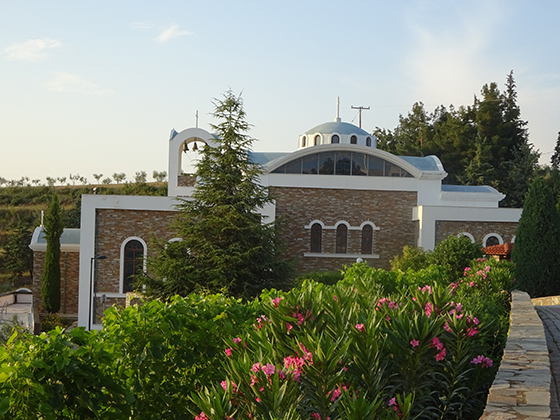
Ἱερός Ναός Ἀναλήψεως τοῦ Σωτῆρος, Ὀρθόδοξη Ἀδελφότητα «Χριστιανική Ἐλπίς», περιοχή Φιλύρου Θεσ/νίκης
Σάββατο 7 Ἰουνίου (Ψυχοσάββατο)
7.15 π.μ. Ὄρθρος, Θ. Λειτουργία, Μνημόσυνο
Κυριακή 8 Ἰουνίου (Πεντηκοστή)
7.15 π.μ. Ὄρθρος, Θεία Λειτουργία
7.00 μ.μ. Ἑσπερινός Ἁγίου Πνεύματος (Γονυκλισίας)
Δευτέρα 9 Ἰουνίου
7.15 π.μ. Ὄρθρος, Θ. Λειτουργία
Ἱκεσία γιά τό κατασκηνωτικό ἔργο
Saint Tarcisius
Translation from the Book
Ὁ Θεός στήν ἱστορία τῆς Ἐκκλησίας, Βοήθημα Κατωτέρου Κατηχητικοῦ Γ΄,
ἐκδ. «Χριστιανική Ἐλπίς» Ὀρθόδοξη Ἀδελφότητα, Θεσσαλονίκη 2016, σσ. 146-152
In underground labyrinths, with maze-like corridors dimly lit by oil lamps, the early Christians buried their martyrs during the first years of persecution. Many of these places, known as catacombs, survive to this day—mainly in Italy, but also in North Africa, Egypt, Palestine, Syria, and even in Greece (Milos, Chalkida, Cyprus). In the Catacomb of Saint Callistus in Rome, on the tomb of a young boy, the following inscription was found:
“Whoever you are, visitor, know that the martyr Tarcisius, who is buried here, was carrying the Sacraments of Christ. And when someone tried to desecrate them, he chose to die rather than hand over the Holy Mysteries to the enemies.”
Behind this inscription, children, lies a deeply moving story of a martyr who was about your age. This happened in Rome, the capital of the mighty Roman Empire, in the middle of the 3rd century—a harsh time for Christians. They were persecuted for their faith, imprisoned, tortured and martyred.
Let’s visit some of those imprisoned Christians today. Tomorrow, they will be taken to the Colosseum, the enormous stadium of Rome, to be handed over to the starving and wild beasts. It was through such gruesome spectacles that the pagan Romans entertained themselves.
Aren’t the Christians terrified, knowing they will soon become food for the beasts? Let us draw near them. What a wonder! We hear them praying, singing hymns to God, and thanking Him for deeming them worthy to suffer martyrdom for His love! They have only one concern: they want to receive Holy Communion, to take our Lord Jesus Christ into themselves! Then they will be invincible—no torture will be able to break them.
It is the eve of the martyrdom. The faithful Christians of Rome wish to stand by their imprisoned brothers. They pray. All are gathered at the Divine Liturgy being celebrated in secret in a catacomb. At the end, the priest turns to the faithful: “My brothers,” he says with deep emotion and concern, “someone must take Holy Communion to our imprisoned brethren. We need someone who is trustworthy, brave, and unlikely to arouse the guards’ suspicion. But who will that be?”
The priest’s eyes search the crowd, looking for the most suitable person for this secret and dangerous mission.
“Holy Father, allow me to take Holy Communion to our imprisoned brothers,” pleads Tarcisius.
The priest hesitates. To entrust the Holy Gifts to a child? But he knows Tarcisius well. Many times, the boy had served at the altar, holding the candle or the censer. He stood out for his reverence and modesty.
“This is a sacred but dangerous mission, Tarcisius,” the priest tells him. “You may be in danger. What will happen then, my child? Under no circumstances must the Holy Gifts fall into the hands of the pagans.”
“By God’s grace, I will guard them as the most precious treasure,” Tarcisius replies. “I will not stop until I complete my mission. I am just a boy—that’s why the soldiers will not suspect me. Give me your blessing, Father!”
The boy’s fervent plea and courage convince the priest. He hands the small, consecrated container with the Holy Communion to the young boy. Tarcisius kisses it reverently and carefully hides it beneath his tunic. His heart beats strongly—for resting upon it is Christ Himself!
 “I would rather die than let anyone take this holy treasure from me,” says Tarcisius with emotion. He makes the sign of the cross and sets off. Nothing else matters to him along the way. His mind is fixed on the Holy Gifts and the imprisoned brothers who longingly await them. As he walks, he comes to a place where many children are gathered and playing. They see him and recognize him.
“I would rather die than let anyone take this holy treasure from me,” says Tarcisius with emotion. He makes the sign of the cross and sets off. Nothing else matters to him along the way. His mind is fixed on the Holy Gifts and the imprisoned brothers who longingly await them. As he walks, he comes to a place where many children are gathered and playing. They see him and recognize him.
“Tarcisius!” they call out. “Come play with us! We need one more for our game.”
“I can’t, my friends,” he replies politely. “I have something important I must do.”
“Come on, Tarcisius,” they insist. “What important thing could you possibly have to do? Come on, we need you.”
“I’m sorry, but I’m in a hurry today. I’ll come play with you another day.”
But the children don’t give up. They grow stubborn. Yet Tarcisius is determined. He presses the Holy Gifts close to his heart and continues on his way. He had promised not to stop anywhere and to guard his treasure. Then one of the older boys shouts:
Tarcisius is hiding something. Tarcisius, what are you hiding under your tunic?"
“Tarcisius is a Christian,” shouts another child. “Maybe he’s carrying the Christians’ secrets!”
“Show us what you’ve got, Tarcisius! Show us—or we’ll take it by force!” some of them threatened.
The children had grown wild. Why won’t Tarcisius give in? Their curiosity was burning. Since he wouldn’t listen to words, they gave each other a signal and reached out to grab what he was hiding. Tarcisius refused. He resisted. And then they started to beat him mercilessly.
“Lord Jesus Christ,” Tarcisius prayed silently, “help me! Don’t let Your Holy Gifts fall into the hands of idol worshippers!”
The cruel blows knocked him to the ground. Still, he held tightly to his holy treasure. No matter how hard the angry boys tried to pry his hands open, they couldn’t do it. Their fury clouded their minds. Mad with rage, they began to stone him with any rocks they could find nearby. Tarcisius now lay on the ground, badly wounded, bleeding. But not even for a moment did he loosen his grip. Blow after blow, his breath began to fade.
At that very moment, a Christian officer named Quadratus was passing by. The noise caught his attention. As he got closer, he saw a boy lying in a pool of blood. The attackers, realizing someone had seen them, ran off in fear. Tarcisius looked up with relief when he saw him. Quadratus knelt beside him.
“Quadratus…” the boy managed to whisper, “I have the Holy Gifts. I kept our treasure safe. Please… make sure it reaches our imprisoned brothers.”
He could barely speak. Touched, Quadratus gently lifted him in his arms. He knew he now held not one, but two treasures: the Body and Blood of Christ and the bloodied body of a young martyr. Tarcisius let his head fall limp. He had just handed over his treasure—and now, he handed over his soul to the Christ he so loved.
“With the fear of God, faith, and love, draw near!”
It’s good to remember the story of Saint Tarcisius every time we go to receive Holy Communion. Let us approach with the same reverence and love. Think how much awe he felt when he received and carried the Holy Gifts! Let us do the same as we go up for Holy Communion—just as the priest invites us during the Divine Liturgy, when he comes out from the Beautiful Gate holding the Holy Chalice. Do you remember his words? “With the fear of God, faith, and love, draw near!” And how is he calling us to approach?
a) With “the fear of God”:
That means with respect and holiness, knowing we are about to receive God Himself into our hearts! In that sacred moment, we don’t speak, we don’t play, we don’t laugh with our friends, or push to go first. Our minds and hearts are focused on Christ. We walk up quietly, and when it’s our turn, we take the red cloth that the priest is holding and place it carefully under our chin. Then we tilt our head back slightly and open our mouth wide, to receive the Body and Blood of Christ from the spoon. Afterwards, we eat the antidoron (the blessed bread), and we are especially careful not to spill any part of the Holy Communion.
b) With faith:
We believe that we are truly receiving Christ Himself. Every Divine Liturgy is a miracle: The bread and wine on the Holy Altar are changed by the Holy Spirit into the Body and Blood of Christ! Each time we receive Communion, we take Christ into our very hearts and become one with Him!
c) With love:
How can we receive God, who is love (see 1 John 4:8, 16), if our heart is holding hatred? In one Sunday School class, two children had gotten into a fight. Just before Communion, one of them asked the catechist: “Do we have to be at peace with everyone before we receive Communion?” “Yes,” the catechist answered. The child then quietly went to the other boy and whispered: “I’m sorry.” The two stood up and went to receive Communion—together. What a beautiful moment! Yes, children—before we receive Communion, we must try, as far as we can, to be at peace with everyone: to ask forgiveness and to forgive.
This is how we should approach Holy Communion: “With the fear of God, faith, and love,” just as the Church calls us to—just as the martyrs did. And every time we receive Holy Communion, let us think of Saint Tarcisius. How tenderly he held the Holy Gifts! With the same longing, let us welcome Christ into our hearts. Let us thank Him for the honor of visiting us, and try—with our words and actions—not to sadden Him.
Each time I receive Communion,
I welcome Christ into my heart.
Like Saint Tarcisius, I too
with faith and reverence
hold deep within me
the holy treasure.
Saint Philothei
Translation from the Book
Ὁ Θεός στήν ἱστορία τῆς Ἐκκλησίας, Βοήθημα Κατωτέρου Κατηχητικοῦ Γ΄,
ἐκδ. «Χριστιανική Ἐλπίς» Ὀρθόδοξη Ἀδελφότητα, Θεσσαλονίκη 2016, σσ. 136-140
During March, the month we are in, we celebrate a bright and glorious double feast: the 25th of March! We rejoice over two joyful events, both for our faith and our homeland: the Annunciation of the Theotokos and the Greek War of Independence in 1821.
Today, we will see a different kind of revolution — one that took place even before the Revolution of 1821. It has been called a “revolution of love”. The leader of this revolution was a woman — Saint Philothei, also known as “the Lady of Athens”.
In 1522 AD, in Ottoman-occupied Athens, a little girl named Regoula was born into the noble Benizelos family. Her wealthy and devout parents, Angelos Benizelos, a leading figure in the city, and Syriga Palaiologou, took special care in raising their beloved and only daughter with a strong Christian upbringing and education. Even from a young age, Regoula stood out for her intelligence and kindness.
When she was still very young, her parents arranged her marriage to one of the noblemen of Athens. However, just three years after the wedding, her husband passed away. Regoula was left a widow but chose not to marry again. Deep in her heart, she held a strong desire: to give all her wealth and her whole life to Christ, whom she deeply loved, and to the suffering people of her homeland.
She truly did this — in the heart of the city of Athens, she founded a unique kind of monastery. Inside this monastery, she established:
✓ A school where Greek children, living under Ottoman rule, could learn to read and write
✓ A workshop where young girls were taught sewing and weaving skills
✓ A shelter where Greek women could find refuge from the dangers they faced under Turkish oppression.
The monastery of this noble Athenian lady became like a great open embrace. Who ever left there with empty hands? Who left still hungry? What elder, orphan, or person in pain didn’t find comfort? Regoula herself, now the abbess with the name Philothei, along with the other nuns, generously offered their love. They gave all their property and all their lives to this great purpose: to love God and to spread His love all around them. Tirelessly, they worked all day and prayed fervently late into the night. In enslaved Athens, their monastery shone like a lit candle, offering hope and light to the poor slaves.
But the Turkish conquerors could not tolerate this light. They wanted to extinguish it by force. The Ottoman authorities ordered that Philothei be arrested. She was thrown into prison and cruelly tortured. Fortunately, the leading citizens of Athens intervened and managed to secure Philothei’s release from prison.
What did Philothei do next? Did she stop her work? Of course not! This is what she lived for — to love God and to care for all those in pain. Her love flowed everywhere like a rushing stream!
 But soon, another order was given for her arrest. It was the night of October 2nd, 1588. The next day was the feast of Saint Dionysios the Areopagites, the patron saint of Athens. In one of the monastery’s chapels, an all-night vigil was being held. Philothei was there, praying, when suddenly a group of Turks rushed into the church. They dragged her outside violently and began to whip her savagely. Her body was covered in wounds. Yet they did not stop beating her until they left her nearly dead. She was so badly injured that, despite the loving care of those around her, she could not recover. A few months later, on February 19th, 1589, she passed away.
But soon, another order was given for her arrest. It was the night of October 2nd, 1588. The next day was the feast of Saint Dionysios the Areopagites, the patron saint of Athens. In one of the monastery’s chapels, an all-night vigil was being held. Philothei was there, praying, when suddenly a group of Turks rushed into the church. They dragged her outside violently and began to whip her savagely. Her body was covered in wounds. Yet they did not stop beating her until they left her nearly dead. She was so badly injured that, despite the loving care of those around her, she could not recover. A few months later, on February 19th, 1589, she passed away.
Each year on this day, our Church honors her memory. Her holy relic is kept in the Metropolitan Cathedral of Athens. Some areas of Athens are named after her: Filothei, Kalogreza, and Psychiko. The area called Psychiko got its name from a kind deed — a “psychiko” — that the kind-hearted Saint Philothei once did there. She paid to have a well built in that spot. She knew many people would pass by on their way into the city from nearby villages, and she wanted to quench their thirst! How many wonderful things can be imagined and achieved by a soul that truly loves God!
A Sacrifice for Christ and the Homeland
During the difficult years of the Ottoman occupation in our homeland, many people, like Saint Philothei, chose to sacrifice their lives rather than deny their faith. They are called Neomartyrs because they were martyred in the more recent centuries of our history. The Neomartyrs are like blooming flowers in the middle of a harsh winter, like bright candles glowing in the deep darkness of slavery! They kept the flame of love for Christ and for their homeland burning strong in their hearts. If they had not existed, perhaps we would not be living today in a free and Orthodox Greece.
And it is true: whoever loves Christ also cares deeply for their homeland. Whoever belongs to Christ is ready to make sacrifices for others. Saint Philothei gave up everything — both her wealth and her life. The love of Christ gave her so much strength and courage!
Would you like to be like Saint Philothei — to have her bravery and her love? Even though you are still young, still in primary school, if you start now to love Christ and your country, if you begin today to make small sacrifices for others, then we can hope that, in the years to come, our history will again be able to show us great heroes — and they will come from you! And then, no matter how many trials it faces, our beloved Greece will never be lost!
ΜΝΗΜΟΣΥΝΟ & ΕΚΔΗΛΩΣΗ ΜΝΗΜΗΣ
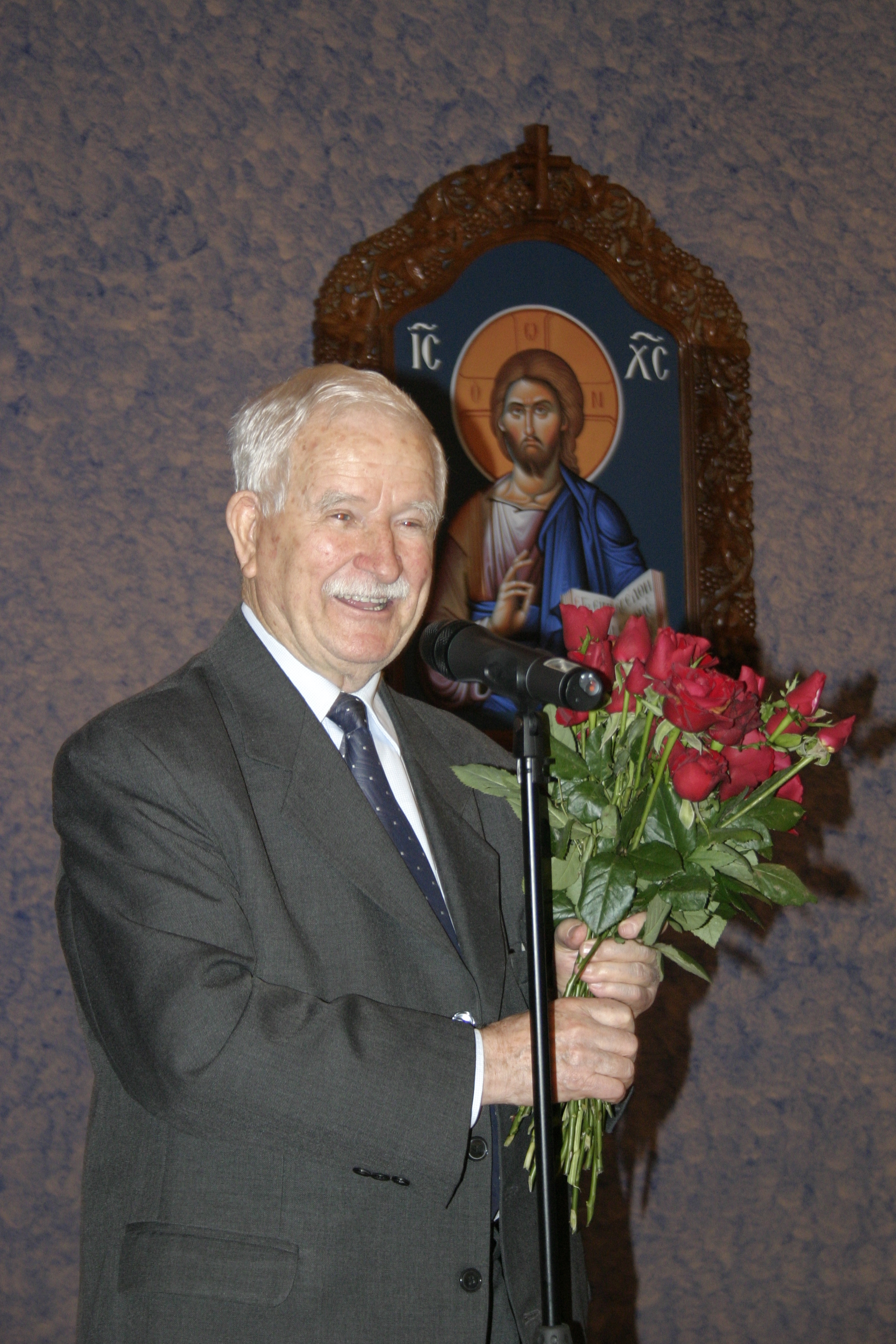
Τήν ἴδια μέρα τό ἀπόγευμα καί ὥρα 6:30 θά πραγματοποιηθεῖ ΕΚΔΗΛΩΣΗ ΜΝΗΜΗΣ στήν αἴθουσα «ΑΠΟΛΥΤΡΩΣΙΣ», Πέλοπος 7, Θεσσαλονίκη.
ΠΡΟΓΡΑΜΜΑ ΑΚΟΛΟΥΘΙΩΝ
Ἱερός Ναός Ἀναλήψεως τοῦ Σωτῆρος, στήν Ὀρθόδοξη Ἀδελφότητα «Χριστιανική Ἐλπίς», στήν περιοχή Φιλύρου Θεσ/νίκης.
Δεῖτε ἐδῶ τό Πρόγραμμα τῶν Ἀκολουθιῶν κατά τήν Μ. Ἑβδομάδα καί τήν Διακαινήσιμο.
Μακριά μας ἡ ραθυμία!
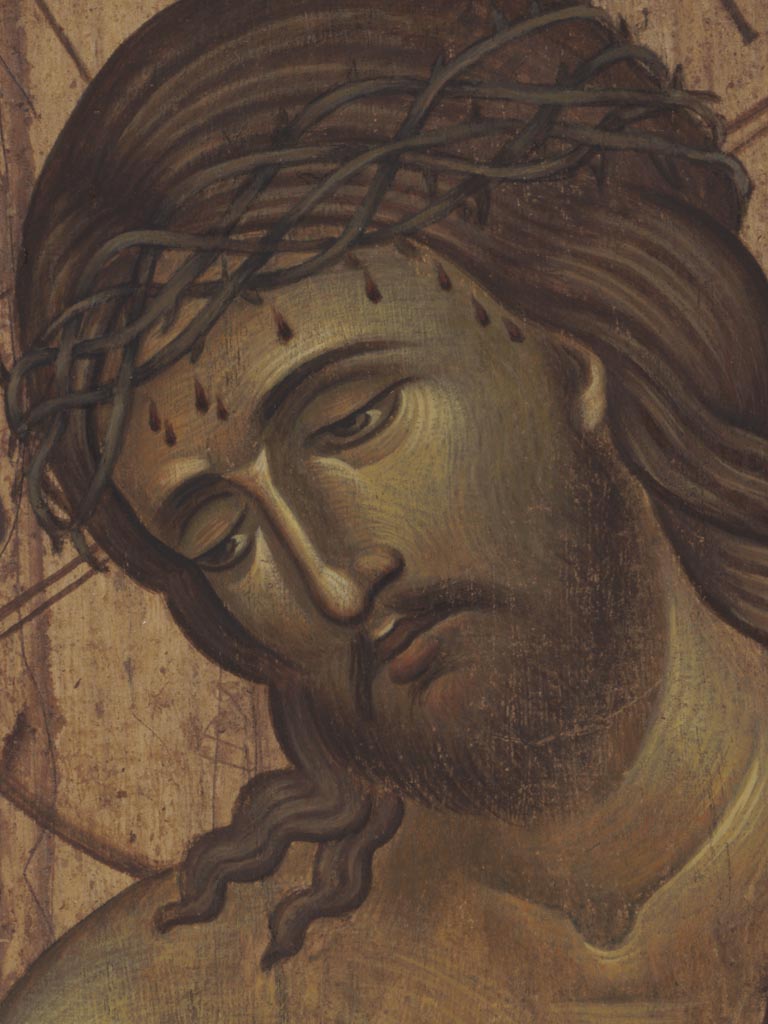 Μεγάλη Ἑβδομάδα. Ἡ Ἐκκλησία μᾶς καλεῖ νά ὑποδεχτοῦμε τόν Κύριο, πού ἔρχεται νά ὑπομείνει τό ἑκούσιο Πάθος του: «Δεῦτε οὖν φιλέορτοι, ὑπαντήσωμεν ᾄσμασιν, ὁ γὰρ Κτίστης ἔρχεται σταυρὸν καταδέξασθαι...». Μᾶς καλεῖ νά συμπορευθοῦμε μαζί του: «Δεῦτε οὖν καὶ ἡμεῖς, κεκαθαρμέναις διανοίαις, συμπορευθῶμεν αὐτῷ...». Καί ἡ ψυχή μας εἶναι πόθους γεμάτη... Νά Τόν ἀκολουθήσουμε! Ἀνακόπτουν ὅμως τήν πορεία μας, στέκονται ἐμπόδια στίς ἐπιθυμίες μας τό φρόνημα τῆς σάρκας, πού κουβαλᾶμε μέσα μας, ὁ κόσμος, πού ἀσκεῖ καθημερινά ἰσχυρή ἐπιρροή ἐπάνω μας, οἱ μέριμνες τοῦ βίου.
Μεγάλη Ἑβδομάδα. Ἡ Ἐκκλησία μᾶς καλεῖ νά ὑποδεχτοῦμε τόν Κύριο, πού ἔρχεται νά ὑπομείνει τό ἑκούσιο Πάθος του: «Δεῦτε οὖν φιλέορτοι, ὑπαντήσωμεν ᾄσμασιν, ὁ γὰρ Κτίστης ἔρχεται σταυρὸν καταδέξασθαι...». Μᾶς καλεῖ νά συμπορευθοῦμε μαζί του: «Δεῦτε οὖν καὶ ἡμεῖς, κεκαθαρμέναις διανοίαις, συμπορευθῶμεν αὐτῷ...». Καί ἡ ψυχή μας εἶναι πόθους γεμάτη... Νά Τόν ἀκολουθήσουμε! Ἀνακόπτουν ὅμως τήν πορεία μας, στέκονται ἐμπόδια στίς ἐπιθυμίες μας τό φρόνημα τῆς σάρκας, πού κουβαλᾶμε μέσα μας, ὁ κόσμος, πού ἀσκεῖ καθημερινά ἰσχυρή ἐπιρροή ἐπάνω μας, οἱ μέριμνες τοῦ βίου.
Ἀρωγός στήν ἀδυναμία μας ἔρχεται ἡ Ἐκκλησία. Προσφέρει τίς ἱερές Ἀκολουθίες της σάν ἕνα ὄχημα, πού μᾶς ἀνεβάζει στή σφαίρα τοῦ οὐρανοῦ, πού ὁδηγεῖ τήν ψυχή μας κοντά, πολύ κοντά στόν Κύριο... Κι ἐνῶ ἐμεῖς, νικημένοι ἀπό τά πάθη καί τήν ἕλξη τῆς γῆς, ἀδυνατοῦμε νά πλησιάσουμε τόν νυμφώνα του, ἡ Ἐκκλησία μέ τίς κατανυκτικές Ἀκολουθίες της μᾶς δίνει τή δυνατότητα νά πορευτοῦμε μαζί του· μέ τά Μυστήριά της μᾶς βοηθᾶ ν᾿ ἀποκτήσουμε ἔνδυμα ἄξιο τοῦ θείου νυμφῶνος.
Δέν εἶναι, λοιπόν, ἀδύνατο γιά τήν ταλαίπωρη ψυχή μας νά ἱκανοποιήσει τή βαθύτερη ἐπιθυμία της, νά πλησιάσει τόν πανάγιο Νυμφίο. Ἀρκεῖ ν᾿ ἀκούσει τή συμβουλή τῆς μάνας Ἐκκλησίας στό ξεκίνημα τῆς Μεγάλης Ἑβδομάδας: «Ρᾳθυμίαν ἄπωθεν ἡμῶν βαλώμεθα....».Ἄς διώξουμε μακριά μας τή ραθυμία! Αὐτή φράζει τόν δρόμο πρός τόν Θεό.
«Ἰδοὺ ὁ Νυμφίος ἔρχεται ἐν τῷ μέσῳ τῆς νυκτός, καὶ μακάριος ὁ δοῦλος, ὃν εὑρήσει γρηγοροῦντα, ἀνάξιος δὲ πάλιν, ὃν εὑρήσει ῥᾳθυμοῦντα....», ὑπενθυμίζει ἡ Ἐκκλησία σέ κάθε Ἀκολουθία τοῦ Νυμφίου. Μᾶς παρακινεῖ νά κάνουμε διάλογο μέ τή ράθυμη ψυχή μας: «Τί ραθυμεῖς, ἄθλια ψυχή μου;... Γιατί ἀσχολεῖσαι μέ τά πρόσκαιρα;...». Βάζει στά χείλη μας καί μιά ἐναγώνια προσευχή: «Ἀπό τῆς ψυχῆς τή ραθυμία νύσταξα, νυμφίε Χριστέ, καί δέν ἔχω ἀναμμένη τή λαμπάδα τῶν ἀρετῶν... Ἀλλά, Δέσποτα, μήν κλείσεις γιά μένα τά σπλάχνα τῶν οἰκτιρμῶν σου...». Γιά νά μήν κλείσει καί γιά μᾶς ἡ πόρτα τῆς οὐράνιας βασιλείας, γιά νά μή βρεθοῦμε ἀνέτοιμοι στήν ὑποδοχή τοῦ Νυμφίου, χρειάζεται ἐπειγόντως ἀνάνηψη καί ἐγρήγορση.
Μέ τήν Ἐκκλησία του ὁ νυμφίος Χριστός ἁπλώνει τό χέρι του σέ μᾶς. Ἄς μή ραθυμήσουμε νά τοῦ δώσουμε κι ἐμεῖς τό δικό μας. Μόνοι μας δέν τά καταφέρνουμε, σκοντάφτουμε σέ τόσα ἐμπόδια... Μαζί του ὅμως μποροῦμε νά φτάσουμε ὥς τή χαρά τῆς Ἀνάστασης!
"Ἀπολύτρωσις", Ἀπρίλ. 2025
ΔΕΛΤΙΟ ΤΥΠΟΥ
ΔΕΛΤΙΟ ΤΥΠΟΥ
Τά Χριστιανικά Σωματεῖα τῆς Θεσσαλονίκης ἐκδηλώνουν τήν ἀγανάκτησή τους γιά τήν προσβολή τῶν Ἱερῶν Προσώπων τῆς Πίστεώς μας μέ τή φιλοξενία στήν Ἐθνική Πινακοθήκη κατ' εὐφημισμόν "ἔργων τέχνης", μέ τά ὁποῖα κατά γενική ὁμολογία βεβηλώνονται τά ἱερά καί ὅσια τῆς φυλῆς μας.
Τά συγκεκριμένα ἔργα πού ἀσχημονοῦν πάνω στά Ἱερά Πρόσωπα, θά ἔπρεπε νά εἶναι παράδειγμα πρός ἀποφυγή καί ὄχι πρός προβολή σέ ὁποιονδήποτε χῶρο, ἰδιαιτέρως ὅμως σέ ἕνα δημόσια κτήριο, πού τό ἐπισκέπτονται μεταξύ ἄλλων καί μαθητές ἐκπαιδευτικῶν ἱδρυμάτων, γιά νά ἐντρυφήσουν, ὑποτίθεται, στήν τέχνη, ἡ ὁποία πρέπει νά λειτουργεῖ ὡς ἀγωγή ψυχῆς καί προτροπή πρός τό κάλλος, μέ τήν ἔννοια πού ἔδιναν οἱ ἀρχαῖοι πρόγονοί μας.
Ἀναρωτιόμαστε μέ θλίψη γιατί δέν βρέθηκε ἕνας ἁρμόδιος νά ἀνταποκριθεῖ στίς συνεχόμενες διαμαρτυρίες φορέων καί ἐπίσημων προσώπων, πού ἐπί μέρες μεταχειρίζονταν κάθε νόμιμο μέσο, γιά νά φέρουν τούς ὑπεύθυνους πρό τῶν εὐθυνῶν τους, ἔτσι ὥστε αὐτά τά κατά γενική ὁμολογία ἐκτρώματα νά μήν ἐκτίθενται στόν τόσο εὐαίσθητο καί ἱστορικό χῶρο τῆς Ἐθνικῆς Πινακοθήκης.
Καλοῦμε τούς ὑπεύθυνους νά κατεβάσουν τά βλάσφημα αὐτά ἔργα καί ἀπό ἐδῶ καί στό ἑξῆς νά εἶναι στό ἔπακρο εὐαίσθητοι σέ ὅ,τι ἀφορᾶ στήν προστασία τῶν ἱερῶν συμβόλων τῆς Πίστεώς μας, τή στιγμή μάλιστα πού ἡ Ὀρθοδοξία ἀποτελεῖ τήν ἐπικρατοῦσα θρησκεία στήν Πατρίδα μας καί προστατεύεται ἰδιαιτέρως ἀπό ἰσχῦον Σύνταγμα. Ἡ σαφής εὐαγγελική θέση περί ἀποφυγῆς χρήσης βίας ἀπό τούς πιστούς, δέν σημαίνει σέ καμία περίπτωση ὅτι θά ἀποδεχόμαστε ἀπαθεῖς τήν βλασφημία καί τήν προσβολή τῶν Ἱερῶν Προσώπων τῆς Πίστεώς μας στήν Ὀρθόδοξη χώρα μας, τῆς ὁποίας τό χῶμα εἶναι ποτισμένο μέ τό αἷμα χιλιάδων μαρτύρων καί ἡρώων, πού πέθαναν ὑπερασπιζόμενοι τήν Ὀρθόδοξη παράδοση καί ταυτότητά της.
Τά Ὀρθόδοξα Χριστιανικά Σωματεῖα Θεσσαλονίκης:
ΑΔΕΛΦΟΤΗΣ ΟΡΘΟΔΟΞΟΥ ΕΞΩΤΕΡΙΚΗΣ ΙΕΡΑΠΟΣΤΟΛΗΣ
ΓΟΝΕΩΝ ΕΝΩΣΙΣ ΧΡΙΣΤΙΑΝΙΚΗ ΑΓΩΓΗ (Γ.Ε.Χ.Α.)
ΕΛΛΗΝΟΡΘΟΔΟΞΟΣ ΣΥΝΔΕΣΜΟΣ «ΟΙ ΠΑΝΑΓΙΟΦΙΛΟΙ»
«ΕΝΩΜΕΝΗ ΡΩΜΗΟΣΥΝΗ»
ΙΕΡΑΠΟΣΤΟΛΙΚΟΣ ΣΥΝΔΕΣΜΟΣ «ΑΓΙΟΣ ΚΟΣΜΑΣ Ο ΑΙΤΩΛΟΣ»
ΟΡΘΟΔΟΞΟΣ ΧΡΙΣΤΙΑΝΙΚΗ ΑΔΕΛΦΟΤΗΣ «ΑΓΑΠΗ ΧΡΙΣΤΟΥ»
ΟΡΘΟΔΟΞΟΣ ΧΡΙΣΤΙΑΝΙΚΗ ΑΔΕΛΦΟΤΗΣ «ΑΓΙΑ ΦΟΙΒΗ»
ΟΡΘΟΔΟΞΟΣ ΧΡΙΣΤΙΑΝΙΚΗ ΑΔΕΛΦΟΤΗΣ «ΑΠΟΛΥΤΡΩΣΙΣ»
ΟΡΘΟΔΟΞΟΣ ΧΡΙΣΤΙΑΝΙΚΗ ΑΔΕΛΦΟΤΗΣ «ΟΣΙΑ ΞΕΝΗ»
Ο.Χ.Α. «ΑΓΙΑ ΤΑΒΙΘΑ»
ΠΑΓΚΟΣΜΙΑ ΑΚΑΔΗΜΙΑ ΤΗΣ ΡΩΜΙΟΣΥΝΗΣ: ΙΕΡΟΣ ΣΥΝΔΕΣΜΟΣ (Π.Α.Τ.Ρ.Ι.Σ.)
ΠΑΝΕΛΛΗΝΙΟΣ ΣΥΝΔΕΣΜΟΣ ΒΟΡΕΙΟΗΠΕΙΡΩΤΙΚΟΥ ΑΓΩΝΑ (ΠΑ.ΣΥ.Β.Α.)
ΠΑΡΑΚΑΤΑΘΗΚΗ (ΠΑΝΕΛΛΗΝΙΟΣ ΣΥΝΔΕΣΜΟΣ ΓΙΑ ΤΗΝ ΕΛΛΗΝΟΡΘΟΔΟΞΗ ΠΑΡΑΔΟΣΗ)
ΠΡΩΤΟΒΟΥΛΙΑ ΓΟΝΕΩΝ ΒΟΡΕΙΟΥ ΕΛΛΑΔΟΣ
ΠΡΩΤΟΒΟΥΛΙΑ ΠΟΛΙΤΩΝ ΓΙΑ ΤΗΝ ΠΝΕΥΜΑΤΙΚΗ ΕΛΕΥΘΕΡΙΑ
ΣΥΛΛΟΓΟΣ «Ο ΑΠΟΣΤΟΛΟΣ ΠΑΥΛΟΣ»
ΣΥΛΛΟΓΟΣ ΟΡΘΟΔΟΞΟΥ ΙΕΡΑΠΟΣΤΟΛΙΚΗΣ ΔΡΑΣΕΩΣ «Ο ΜΕΓΑΣ ΒΑΣΙΛΕΙΟΣ»
ΣΥΛΛΟΓΟΣ ΠΟΛΥΤΕΚΝΩΝ ΝΟΜΟΥ ΘΕΣΣΑΛΟΝΙΚΗΣ «ΑΓΙΟΙ ΠΑΝΤΕΣ»
ΣΥΛΛΟΓΟΣ ΦΙΛΩΝ Ι.Μ. ΠΑΝΤΟΚΡΑΤΟΡΟΣ ΜΕΛΙΣΣΟΧΩΡΙΟΥ «ΑΓ. ΓΡΗΓΟΡΙΟΣ Ο ΠΑΛΑΜΑΣ»
ΣΥΝΤΟΝΙΣΤΙΚΗ ΦΟΙΤΗΤΙΚΗ ΕΝΩΣΗ ΒΟΡΕΙΟΗΠΕΙΡΩΤΙΚΟΥ ΑΓΩΝΑ (Σ.Φ.Ε.Β.Α.)
ΦΙΛΑΝΘΡΩΠΙΚΟ ΣΩΜΑΤΕΙΟ «ΜΕΡΙΜΝΑ ΠΤΩΧΩΝ»
ΧΡΙΣΤΙΑΝΙΚΗ ΑΔΕΛΦΟΤΗΣ «ΛΥΔΙΑ»
«ΧΡΙΣΤΙΑΝΙΚΗ ΕΛΠΙΣ» ΟΡΘΟΔΟΞΗ ΑΔΕΛΦΟΤΗΤΑ
ΧΡΙΣΤΙΑΝΙΚΗ ΕΝΩΣΗ ΓΟΝΕΩΝ ΘΕΣΣΑΛΟΝΙΚΗΣ
